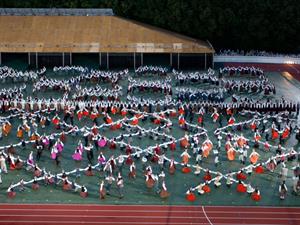PIRMĀ SEMESTRA NOSLĒGUMA TESTI
Before you start to learn about the Latvian Song and Dance Festival, let's remember words that you know about music from grade 6.
The Latvian Song and Dance Festival — [ðiː læt.vi.ən sɒŋ ænd dæns fes.tɪ.vəl]
Latviešu Dziesmu un Deju svētki
The Latvian Song and Dance festival started in 1873. Is one of the most important cultural events in Latvia and has become a symbol of Latvian identity and unity. The festival happens every five years and brings together tens of thousands of singers and dancers all around Latvia. They perform in traditional Latvian folk costumes, which are called tautas tērpi. The participants include large choirs, dance groups and orchestras.
The festival was created by Latvian cultural leaders who wanted to celebrate and perserve Latvian culture, music and traditions. It is also a way to pass on Latvian traditions to the next generation.

Picture 1: Dziesmu un Deju svētki (Daugavas stadions)
Word bank:
Folk costumes — [fəʊk kɒs.tʃuːms] — expresses a national identity through clothing or costume that is associated with a specific region, tautas tērpi
Choir — [kwaɪər] — an organized group of singers, koris
Festival procession — [fes.tɪ.vəl prəˈseʃ.ən] — a ceremonial parade celebrating cultural or religious traditions, svētku gājiens
Heritage — [her.ɪ.tɪdʒ] — nationally treasured cultural and historical values, mantojums
Folklore — [fəʊk.lɔːr] — traditional beliefs, customs and stories, passed though the generations, folklora
Choreography — [kɒr.iˈɒɡ.rə.fi] — sequence of steps and movements in dance, horeogrāfija
Unity — [juː.nə.ti] — the state of being united or joined as a whole, vienotība
Atsauce:
Picture: Ints Vikmanis / Shutterstock.com